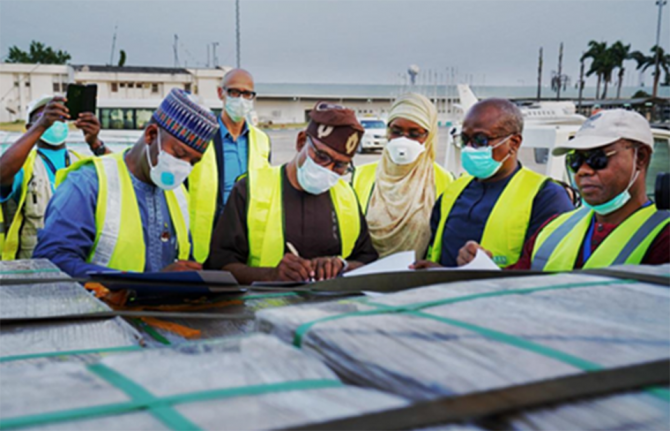

Feature Story
UNAIDS and the wider United Nations system supporting the COVID-19 response in Nigeria
10 July 2020
10 July 2020 10 July 2020The United Nations system in Nigeria joined the fight against COVID-19 shortly after the first case was detected in the country in late February 2020.
UNAIDS’ lessons learned and expertise in facilitating, linking and bringing stakeholders together have been instrumental in guiding the United Nations multi-agency response, led by the Resident Coordinator, Edward Kallon. And by proactively mobilizing its political capital and goodwill in the country, UNAIDS has helped to bring resources and better lines of communication, coordination and accountability to the national COVID-19 response.
In mid-March, the Presidential Task Force was established to develop a COVID-19 response plan for how organizations should work together. Appointed as the only development member of the task force, the Representative, a.i., of the World Health Organization (WHO), Fiona Braka, provides the overall United Nations technical leadership to the government. Lessons learned from the HIV response fed into the development of the “four ones” guiding principles for the national response to the COVID-19 pandemic—one national COVID-19 multisectoral pandemic response plan, one COVID-19 national coordinating authority, one COVID-19 monitoring and evaluation system and one COVID-19 financing and investment platform.
“The “four ones” principles will simplify and clarify roles, responsibilities and relationships, including within the government,” said the Minister of Health of Nigeria, Osagie Ehanire.
Another lesson learned from the HIV response was the importance of ensuring that marginalized and vulnerable people are given consideration at every step of the development of a response to a pandemic. The potential impact of COVID-19 on people living with HIV, key populations and the poor also had to be at the centre of decision-making.
“UNAIDS regularly coordinated with the networks since the beginning of the COVID-19 outbreak, providing technical guidance and ensuring synergy with the efforts of the government,” said Abdulkadir Ibrahim, the National Coordinator of the Network of People Living with HIV/AIDS in Nigeria.
Working with the United Nations Development Programme, UNAIDS liaised with the wider United Nations system and the government and facilitated the handover of US$ 2 million worth of emergency medical commodities to the government, ensuring that the supplies and equipment were prioritized for use in public health facilities and by health-care workers.
The One UN COVID-19 Basket Fund was launched on 6 April. Part of one of the “four ones”, the one COVID-19 financing and investment platform, the Basket Fund channels the contributions of donors to the COVID-19 response. UNAIDS played a critical role in its establishment, working with the United Nations Resident Coordinator and the United Nations Development Programme to ensure that the financing platform put people and communities at the centre. UNAIDS, UN Women, WHO and the United Nations Population Fund helped to mobilize US$ 6.5 million for civil society and community engagement, social protection for vulnerable households, community-led surveillance and monitoring of COVID-19 and HIV and the documentation of community best practices.
In announcing a €50 million contribution to the Basket Fund, the Head of the European Union delegation to Nigeria, Ketil Karlsen, said, “The COVID-19 Basket Fund gives us the opportunity to cooperate and act rapidly in the deployment of assistance that can help to enhance health-care services and cushion the most vulnerable.”
Perhaps the most important contribution by UNAIDS to the COVID-19 response in the country, however, has been advocating to harness the vast HIV infrastructure in the country for the fight against COVID-19.
“We must leverage HIV assets on the ground, including not just laboratory facilities but community health workers and volunteers. To fight COVID-19 effectively we will have no choice but to engage communities to own the response,” said Erasmus Morah, the UNAIDS Country Director for Nigeria.
In a joint effort, the United States Government, the National Agency for the Control of AIDS, the United Nations Children’s Fund, WHO, UNAIDS and the Presidential Task Force mapped and initiated the engagement of approximately 100 000 community health-care workers and volunteers to undertake risk communication, social mobilization, contact tracing and home care.
COVID-19 is far from over in the country, with cases steadily rising, and United Nations staff have not been spared. However, as Mr Kallon, said, “The United Nations must stay open for business and deliver for the people while ensuring that staff members and their dependents are provided with the necessary environment for their protection against COVID-19.” Following this, a COVID-19 isolation and treatment centre as an extension of the United Nations clinic was established for staff as frontline workers, together with their dependent family members.
Moving forwards with the COVID-19 response, in addition to the continued support for the Presidential Task Force, the United Nations Country Team, including UNAIDS, is gearing up to support Nigeria to address the major gaps in subnational preparedness. Key issues such as the loss of livelihoods, heightened vulnerabilities and food insecurity, the increased risk of gender-based violence and limited access to essential health services will also be addressed in the coming months.



